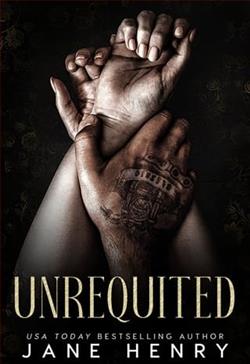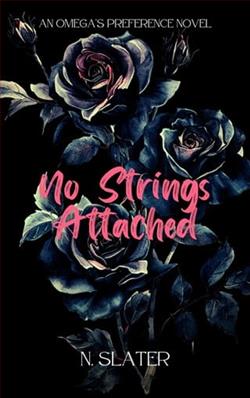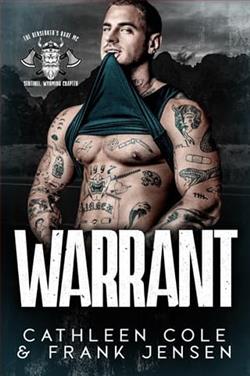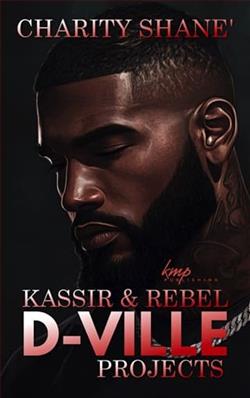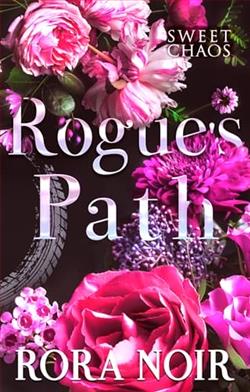Page 46 of Velvet Betrayal
I stepped inside. The air smelled faintly of cedar and cheap paperbacks. The string lights he'd stapled to the ceiling flickered. “Kieran,” I murmured. “This is…”
“I know it’s messy...”
Rosie threw her arms around Kieran’s waist. “Thank you, Key,” she said. “This is perfect.”
Rosie was already curled up with a book, legs swinging. She looked up just once. “This is way better than the real library. Mami says libraries don’t let you wear pajamas.”
Kieran held back laughter. “I didn’t know about that rule,” he said. He hooked his ankle over his knee and sat on the floor beside her. “Real libraries also don’t serve snacks. I made an exception.”
He opened a bakery bag—clementines, a gingerbread man, and a hot cross bun. Rosie squealed. I stared at him.
In the daylight, the tattoo on his arm—three blue helix bands—looked faded, almost gentle. I leaned against the counter, teabag string looped around my wrist, pretending to check emails but really just watching.
Kieran tore the gingerbread man in half and offered a piece to Rosie, who took it without looking up. Then he looked at me, unexpectedly formal, and said, “Do you want the head or the feet?”
“I never have the heart to eat either,” I said.
He grinned, then popped both in his mouth. “No mercy,” Rosie said, not even glancing up.
“No mercy,” Kieran agreed.
It was a weird kind of peace, like a hostage handoff in a public park. But at least Rosie was happy, and for an hour sherebuilt a LEGO city at the table, elbows pinning the instructions, tongue poking out in concentration. I could see traces of Kieran in her—the way she doubled down when something didn’t come easy, how she got tunnel vision with her whole body, jaw set like she’d rather break the thing than walk away from it.
I brought my computer to the shed and joined them. I opened my laptop, stared at the inbox full of flagged cases, and closed it again. The weight of it settled in my chest—names I’d promised justice, deadlines I was already blowing. I drafted a text to Alek, then deleted it. What was I going to say? That I’d be back soon? That I was fine? I wasn’t. And I knew the job didn’t wait. I just couldn’t make myself show up for it, not yet.
I missed my mother, suddenly and painfully. I wondered what she’d say if she saw me now, tangled up with a Callahan again. Would she tell me to run, or to fight for it? Would she remember how much she’d wanted for me, before the chemo, before she left nothing but a handful of useless advice—protect Rosie, don’t sacrifice your happiness for a man.
Rosie’s Bugs and Badgers book ended up as a hat, balanced on her head as she marched into the living room. “I’m a library queen,” she announced, then started reordering the books on the lowest shelf, alphabetizing them for no reason but the need for order.
Kieran followed, crouched beside her, helping restack paperbacks by color. Watching them, you’d think this was a normal weekend—dad and daughter, stubborn and silent, soaking up each other’s company while the world spun outside.
It was so close to normal it felt cruel.
Eventually, Kieran caught me watching and just…watched back. It wasn’t a plea. It was steadier than that, a quiet ask: Can I stay?
I broke the stare, muttered something about laundry. Upstairs, I closed the linen closet door and just stood there,hands braced to the shelves, breathing in detergent and faint mildew, willing myself not to cry.
I didn’t want to want this.
But there it was: the shape of the life I could’ve had—messy, loud, unfinished. Kieran, who brought thunder and devotion in equal measure. Rosie, who carried the best of both of us.
And me, aching in a hallway, trying to forget that I already knew what it felt like to lose them.
Kieran
Ruby had to go back to court.
Rosie had to go to Julian’s.
I was left back at the house, which was not technically my house. I watched my own hands as I clattered around, cleaning up in the aftermath of the breakfast tornado, feeling not unlike a friendly, heavily tattooed poltergeist. I made the beds, straightened the couch slipcover, found six mismatched socks under the radiators, and then ran one finger down the edge of the window glass, hunting for advanced surveillance as if Ruby didn’t already know every cop and snitch in the metro area by sight and smell.
I poured what was left of the coffee and sat at the kitchen table, staring at the wall. The house was quiet except for the creaks in the floor and the hum of the fridge. It felt strange, sitting still. I wasn’t built for stillness. In my family, there was always something to fix or protect or fight. You didn’t get to just sit. You didn’t get to want anything.
Now, with the Crew supposedly taken care of and Tristan pulling strings, there wasn’t much left for me to do. And that should’ve been a relief—but it wasn’t. I didn’t know how to bein this space with Ruby without a job to anchor me. Without a reason to be here, I felt like I might vanish.
But I wasn’t leaving. Even if she never asked, even if she never said the word, I was staying. I’d let her take the lead because I didn’t want to spook her, but I was still here. I was still watching. Still ready. Tristan could play diplomat. I’d handle the rest.
I drove to City Hall and parked right out front. It was early, that sharp, wind-cutting cold that welded your ears to your skull and made every stranger walk hunched and fast, pretending to belong. The main glass doors weren’t even open yet, and already the security crew inside looked bored, waiting for the day to get ugly.









